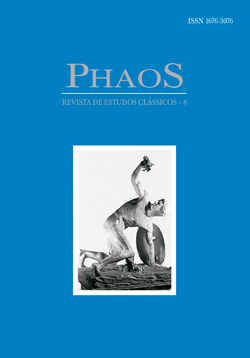φιληδής e outros compostos sigmáticos em -ηδης (μελιηδής, θυμηδής, αὐθάδης)
Palabras clave:
S-stem adjective compounds. Compound derivation. Compound orientation.Resumen
First attested in Aristotle, the compound φιληδής may be a convenient staring point for a brief appraisal of older s-stem adjective compounds of the -ηδης type. As argued in this article, compounds in -ηδης may be interpreted as right-oriented compounds having either a nominal (μελιηδής) or a verbal head (θυμηδής, αὐθάδης). Those showing a verbal head, it is claimed, are best interpreted as derived from the aorist stem. The verbal character in such compounds seems to have been so clear in later times that, in a scholium to Pindar, φιληδής is not taken anymore as a verb-first compound (= “who is fond of pleasure”) but as a verb-second compound (= “who pleases easily”).Citas
BECHTEL, F. (19642 [1914]). Lexilogus zu Homer. Etymologie und Stammbildung homerischer Wörter, Hildesheim.
BENVENISTE, É. (1969). Le vocabulaire des institutions indo-européennes, 2 vols., Paris.
CHANTRAINE, P. (1968). Dictionnaire étymologique de la langue grecque: Histoire des mots, Paris.
GOTŌ, T. (1987). Die “I. Präsensklasse” im Vedischen. Untersuchung der vollstufigen thematischen Wurzelpräsentia, Viena.
HOENIGSWALD, H. M. (1977). “Diminutives and Tatpuruṣas: the Indo-European trend towards endocentricity”, Journal of Indo-European Studies 5, 9-13.
KLUGE/SEEBOLD – Etymologisches Wörterbuch der deutschen Sprache. Bearbeitet von Elmar Seebold, 24. durchgesehene und erweiterte Auflage, 2002, Berlim/Nova York.
LIV – Lexikon der indogermanischen Verben. Die Wurzeln und ihre Primärstammbildungen, ed. H. Rix et al., 2a edição (2001), Wiesbaden.
LSJ – A Greek-English Lexicon, edd. H. G. Liddell, R. Scott, H. S. Jones e R. McKenzie, Ninth Edition (1996), Oxford.
MAYRHOFER, M. (1986-2000). Etymologisches Wörterbuch des Altindoarischen, 3 vols., Heidelberg.
MEISSNER, T. (2006). S-Stem Nouns and Adjectives in Greek and Proto-Indo-European. A Diachronic Study in Word Formation. Oxford.
RISCH, E. (1974). Wortbildung der homerischen Sprache, Berlim/Nova York.
ROSÉN, H. B. (1959). “Die Ausdrucksform für ‘veräußerlichen’ und ‘unveräußerlichen’ Besitz im Frühgriechischen: Das Funktionsfeld von homerischen φίλος”, Lingua 8, 264-93.
SCHELLER, M. (1959). Vedisch priyá- und die Wortsippe Frei, Freien, Freund. Eine bedeutungsgeschichtliche Studie, Göttingen.
TISCHLER, J. (1979). “Zu den syntaktischen Grundlagen der Nominalkomposition: Die Reihenfolge der Teilglieder”, in Brogyanyi, B. (ed.) Studies in Diachronic, Synchronic, and Typological Linguistics – Festschrift for Oswald Szemerényi on the Occasion of his 65th Birthday, vol. II, Amsterdã, 853-68.
TRIBULATO, O. (2006). “Homeric θυμολέων and the Question of Greek ‘Reversed Bahuvrīhis’”, Oxford University Working Papers in Linguistics, Philology and Phonetics 11, 162-78.
TRIBULATO, O. (2007). “Greek Compounds of the Type ἰσόθεος ‘Equal to a God’, ἀξιόλογος ‘Worthy of Note’, ἀπειρομάχας ‘Ignorant of War’, etc.”, Mnemosyne 60, 527-49.
TUCKER, E. F. (1990). The Creation of Morphological Regularity: Early Greek Verbs in -éō, -áō, -óō, -úō and -íō, Göttingen.
Descargas
Publicado
Número
Sección
Licencia
Ao se submeterem textos para a PhaoS, seus autores devem estar cientes de que, se aprovados para publicação, a revista terá sobre eles todos os direitos autorais pertinentes. Originais não serão devolvidos.

